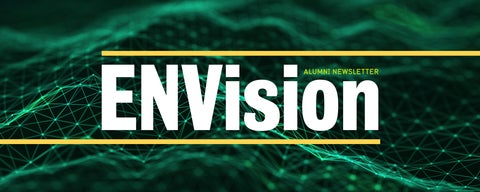
Stay connected with the Faculty of Environment and the growing global community that includes over 52,750 alumni.
Subscribe to ENVision — our alumni and friends newsletter — and receive each issue directly to your inbox and read past issues below.
The latest issue
To borrow the words of this year’s TD Walter Bean Professor in Environment, Sir Andrew Steer, “we must have the courage to act” because the impacts of climate change are already here. That courage is something our alumni demonstrate every day whether they’re leading clean energy innovations, shaping sustainable policies, or helping communities adapt to a changing climate. Your work reminds us that the path from fossil fuel dependence to a cleaner, more equitable energy future may be challenging, but it’s one we’re navigating together.
In this issue of ENVision, we share how our alumni, researchers and students are driving the energy transition and shaping real-world solutions. You’ll also find a record number of class notes, underscoring that our Environment community continues to grow, connect and inspire.
Enjoy the stories and updates in this issue and please stay in touch.
Read our past issues
Like what you see? Email us to access stories older than three years.
The publishing team
Advisor
Bruce
Frayne
Dean,
Faculty
of
Environment
Editors
Maryam
Latifpoor-Keparoutis
Director,
Advancement
Rebecca
Wickens
Director,
Strategic
Initiatives
&
Communications
Content curators
Chantal Vallis
Communications Manager
Vesti Powell
Senior Alumni Advancement Manager